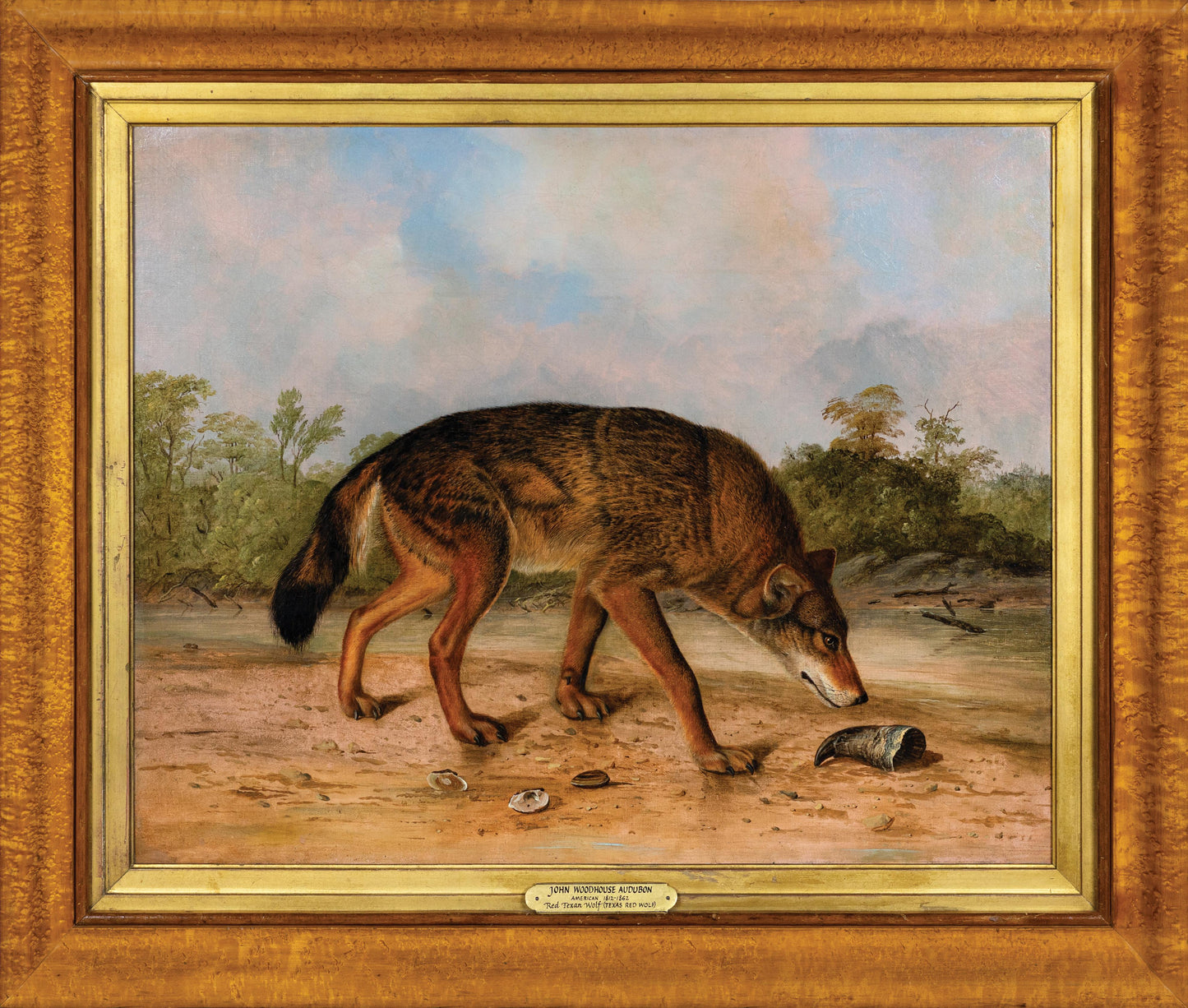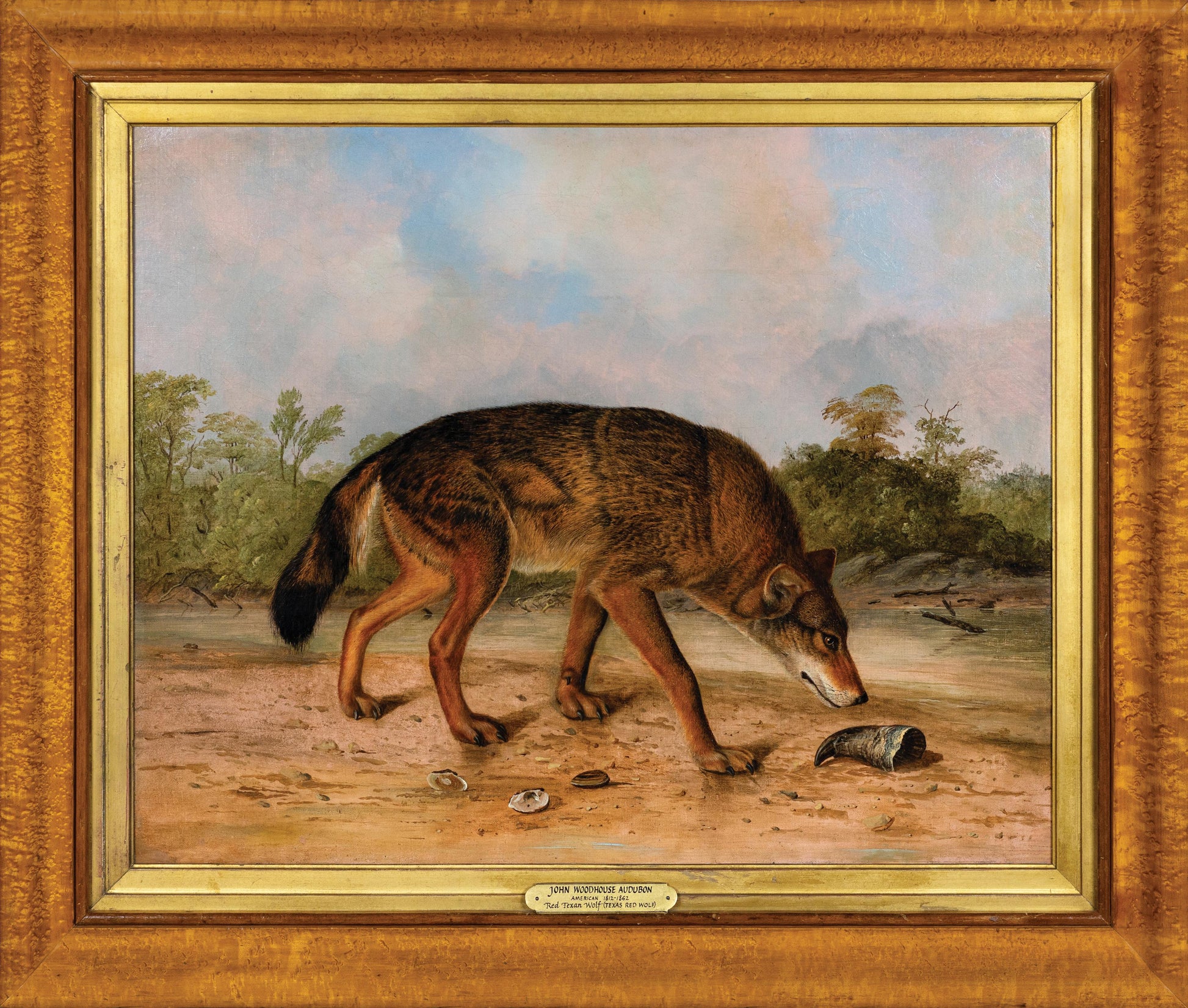from: Mammal Paintings
John Woodhouse Audubon (American, 1812-1862). Red Texan Wolf, Plate 82.
John Woodhouse Audubon (American, 1812-1862). Red Texan Wolf, Plate 82.
Couldn't load pickup availability
AUDUBON, John Woodhouse (American, 1812-1862).
Red Texan Wolf, Plate 82.
Oil on canvas.
Circa 1845 for plate LXXXII in the Viviparous Quadrupeds of North America (New York: J.J. Audubon, 1845-1849).
25" x 30" canvas, 30" x 35" framed.
Provenance: Chase Bank of Texas, Houston, Texas.
Audubon's most important original oil painting relating to his time in Texas that has ever come on the market.
Illustrated: Sarah E. Boehme. John James Audubon in the West: The Last Expedition Mammals of North America. New York: Harry Abrams, 2000, p. 66.
A unique oil painting of the Red Texan Wolf was painted by John James Audubon's son John Woodhouse Audubon for the Viviparous Quadrupeds of North America. Father and son visited Galveston and Houston in the Republic of Texas in 1837. They again visited Texas from 1845 to 1846, where Sam Houston hosted them. During both trips, John Woodhouse Audubon studied Texan Animals, and this magnificent oil painting is the result. This is Audubon's most important original oil painting relating to his time in Texas that has ever come on the market.
This engaging composition was the basis for plate LXXXII, "Red Texan Wolf" (example illustrated below.) The corresponding text for this plate provides a lot of detail related to the habits of this southwestern mammal. First, Audubon explains the nuances of the composition. Writing, "We have represented a fine specimen of this Wolf, on a sand-bar, snuffing at the bone of a buffalo, which, alas! is the only fragment of "animal matter" he has in prospect for breakfast." The location on sandbar indicates the a location near a body of water.
Further, the text for this plate includes an extract from the journal kept by J. W. Audubon while in Texas. It gives us a glimpse of an adventure with a hungry wolf, relayed by Texan Ranger named Powell [possibly Capt. J. S. Powell]:
"Like all travellers, the ranger rides over the wide prairie in long silences of either deep thought or listless musings, I have never been able to decide which; hut when, riding by the side of Walker or Hays [presumably this is referring to Capt. John Coffee "Jack" Hays, arguably the most famous Texas Ranger], who would like to say that a vacant mind was ever in the broad brow or behind the sparkling eye either of him with the gray, or of him with the brown 1 but at times when watching closely I have thought I could trace in the varying expression, castle after castle mounting higher and higher, till a creek "to water at," or a deer which had been sound asleep and to windward of us, started some 30 or 40 yards off our path to wake up the dreamers of our party. No one is certain that his queries will be welcome to the backwoodsman on a march through a strange country, any more than would be those of a passenger, put to the captain of a vessel as he leans over the weather-rail looking what the wind will be, or thinking of the disagreeable bustle he will have, when he gets into port, compared to his lazy luxury on shipboard: but as I rode by the side of Powell we started no deer, nor came to a "water hole," but a Red Wolf jumped up some two or three hundred yards from us, and took to the lazy gallop so common to this species; "Run you ," cried Powell, and he sent a yell after him that would have done credit to red or white man for its shrill and startling effect, the Wolf's tail dropped lower than usual, and now it would have taken a racer to have overtaken him in a mile; a laugh from Powell, and another yell, which as the sound reached the Wolf made him jump again, and Powell turned to me with a chuckle, and said, "I had the nicest trick played me by one of those rascals you ever heard of." The simple, how was it, or let's have it, was all that he wanted, and he began at the beginning. I was out on a survey about 15 miles west of Austin, in a range that we didn't care about shooting in any more than we could help, for the Camanches were all over the country; and having killed a deer in the morning, I took the ribs off one side and wrapping them in a piece of the skin, tied it to my saddle and carried it all day, so as to have a supper at night without hunting for it; it was a dark, dismal day, and I was cold and hungry when I got to where I was to camp to wait for the rest of the party to come up next day; I made my fire, untied my precious parcel, for it was now dark, with two sticks put up my ribs to roast, and walked off to rub down and secure my horse, while they were cooking; but in the midst of my arrangements I heard a stick crack, and as that in an Indian country means something, I turned and saw, to my amazement, for I thought no animal would go near the fire, a large Red Wolf actually stealing "my ribs" as they roasted; instinct made me draw a pistol and let drive at him; the smoke came in my face and I saw nothing but that my whole supper was gone. So not in the most philosophical manner 1 lay down, supperless, on my blanket; at daylight I was up to look out for breakfast, and to my surprise, my half-cooked ribs lay within twenty feet of the fire, and the Wolf about twenty yards off, dead; my ball having been as well aimed as if in broad daylight."
Ben Love, Chairman of Texas Commerce Bank, purchased this painting 40 years ago. Mr. Love eventually sold his bank in December of 1986 to Chemical Bank, which became part of JP Morgan Chase. If the bank had stayed independent, this incredible masterpiece of Texana never would have been sold. Now, 40 years later, it is available.
Condition report: In overall very fine condition. Examined under UV light: Minor aged varnish and light scattered inpainting in the sky region, particularly the top corners. The wolf appears untouched. Canvas relined but appears to retain its original stretcher.


